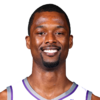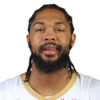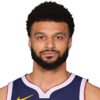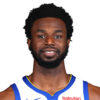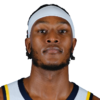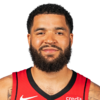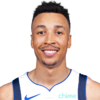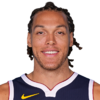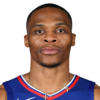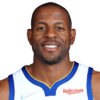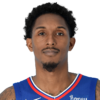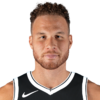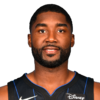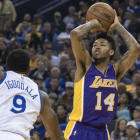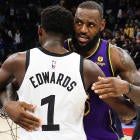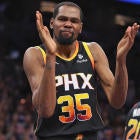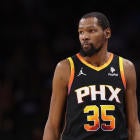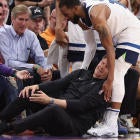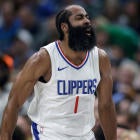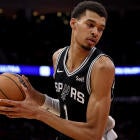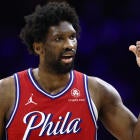It's wild to think that one year ago, when the Indiana Pacers traded Paul George to the Oklahoma City Thunder for Victor Oladipo and Domantas Sabonis, the consensus was that the Pacers got hosed, even though George was presumed to be only a one-year rental for the Thunder.
Then, suddenly in the perfect situation, Oladipo became an absolute star. He increased his scoring from 15.9 points per game to 23.1. He became an above-average three-point shooter and continued his rise as one of the NBA's top perimeter defenders. He was named to the Eastern Conference All-Star team. He won the NBA's award for Most Improved Player. He ascended to superstar level.
Meanwhile, the Thunder later traded for one more player who they believed would complete their puzzle: 10-time All-Star and former NBA scoring champion Carmelo Anthony. And while Oladipo ascended, Anthony descended from superstar to, well, just kind of a guy. He turned in by far the worst season of his career. He averaged 16.2 points per game, nearly five points fewer than his former career low, and he did so inefficiently, shooting the lowest field-goal percentage of his career.
Who will be the Victor Oladipos and Carmelo Anthonys of the 2018-19 NBA season?
There weren't many who predicted the rise of Oladipo or the fall of Melo before last season. But here's a stab at the players who could ascend or decline this coming season.
*Note: For NBA rankings of player efficiency rating (PER), I only included players who logged 1,000 minutes or more.
Ascension Candidates
Barnes is halfway through his four-year, $94 million contract with the Mavericks. While Dallas hasn't been anywhere close to good in those two years -- 33 wins one season, 24 wins the next -- Barnes has been very good in a featured role despite a lackluster supporting cast. Now that supporting cast is suddenly much better. Dennis Smith Jr. ought to make a leap in his second season starting at point guard. DeAndre Jordan will be a huge help on defense. And most importantly, scouts I've spoken with feel Luka Doncic is the most NBA-ready player selected in the lottery after starring against grown men in the EuroLeague last year. Dirk Nowitzki recently echoed those thoughts after preseason workouts: "I couldn't believe what I saw for a 19-, 20-year-old." Barnes ought to be a beneficiary of Doncic's masterful playmaking and passing abilities. While Mark Cuban's dreams of a playoff run in the stacked West feel far-fetched, this team ought to be markedly improved.
Ingram improved across the board during his second season in the NBA, and he got better as the season went on, even taking on some point guard duties in Lonzo Ball's absence. Now Ingram gets to play alongside the one NBA player who is the best at making players around him better: LeBron James. There are a lot of questions around the Lakers -- Ball's health, how the feisty new personalities will fit together, how minutes will be divided between veterans on short contracts and the youth that the Lakers' future will be built around, and whether they have enough three-point shooting around LeBron -- but if Ingram continues on his star trajectory, he won't be one of the question marks.
Murray was seen as a tweener coming out of Kentucky: Too small to be a shooting guard, too turnover-prone to become an actual point guard. But Murray became a legit point guard in his second season in the NBA, and this year he will be the Nuggets' primary ballhandler. And he's on a trajectory to become an elite NBA scorer. Murray ranked 48th in the NBA with a 57.6 percent true shooting percentage. While that may not sound particularly impressive, how about this context: That ranks Murray fifth all-time in true shooting percentage for guards age 21 and younger. Outranking him are some impressive names: Magic Johnson, Eric Gordon, Michael Jordan and Andre Iguodala.
Why pick Wiggins as an ascension candidate after last season was so clearly a step in the wrong direction? For a few reasons: The Wolves are invested in him doing so with his max contract. Also, the Wolves may have one of the most pressing situations in the NBA this season, where they need to show a path toward becoming a top team in the West or Jimmy Butler may bolt as a free agent to a contender. And because Wiggins is still oozing with talent. As frustrated as Wiggins has been -- the inconsistency from game to game, the lack of concentration on defense, the insistence on taking long twos -- he's still only 22 years old, and he at times showed improvement on defense last season. Wolves sources tell me the team -- which attempted fewer three-pointers than any team in the NBA last season -- will be tweaking its philosophy to be more in line with the modern three-point-heavy NBA. While Wiggins' three-point shooting dipped last season as he adjusted to a less-featured role, he shot an acceptable 35.6 percent the year before. If Wiggins doesn't make a step in the direction of better efficiency and more tenacious defense, however, the Wolves could suddenly be heading in the wrong direction.
Turner was on all of these breakout player lists going into last season. On the surface, though, he struggled. He missed a chunk of games with elbow injuries, and teammate Victor Oladipo stole his spotlight as Turner's production dipped slightly during a season when he was expected to rise. But his efficiency numbers showed Turner to still be a very valuable player. In the hope of making a jump this season and getting a big contract extension, Turner has worked incredibly hard on his body in the offseason, hitting the gym and improving his diet. Turner has been a consistent player throughout his short career, but he's never made that jump to star. Perhaps this season he will.
VanVleet is one of the smartest and most intuitive basketball players in the NBA, which he proved during his second season in a more prominent role. VanVleet went from a bit role into a player who quarterbacked the second unit and played 20 minutes per game. His sub-6-foot size belies his being one of the best guard defenders in the NBA. The Raptors are simply a much better team when VanVleet is on the floor. He plays like a league veteran instead of a third-year player. Only three players in the NBA had a better net rating during last year's regular season than VanVleet's 12.1 net rating. Those players are named Stephen Curry, Eric Gordon and Chris Paul.
Lots of projection with this pick. But the Jazz clearly believe in Exum as they gave him a three-year, $33 million contract despite being limited to only 80 games the past three seasons because of injuries, including only 14 games last season. If healthy, the 23-year-old former No. 5 pick can be a difference-maker for a Jazz team that will be close to the top of the West. Exum's defense in the playoffs was often excellent, especially against James Harden; the Jazz's season essentially ended the moment Exum went down with an injury in Game 4 against Houston. A fully healthy season from Exum could make his contract look like a bargain.
Gordon became a basketball player last season instead of just an athlete, and he was rewarded with a four-year, $84 million contract extension as a foundational piece for a Magic team that's loaded with long, tantalizing, athletic talent. Gordon made a big jump in his fourth NBA season with career highs in minutes, points, rebounds, assists, steals and blocks. Gordon's career is following a Blake Griffin-like trajectory as an elite athlete who is expanding his game outside just the paint. If Gordon doesn't achieve true stardom this year, he could by next season as this young Magic team grows around him.
Regression Candidates
Yes, Russell Westbrook is awesome. He's the most exciting player in the NBA. He works his tail off on the basketball court. But for a player like Westbrook, who relies so much on his athletic gifts, it's fair to assume his regression could come sooner instead of later. It was announced this week that Westbrook underwent arthroscopic surgery on his right knee and will be re-evaluated in four weeks, meaning he might miss the preseason. Maybe that means nothing. Or maybe it's foreshadowing. Westbrook turns 30 in November. As great as he was last season -- he finished fifth in MVP voting -- his player efficiency rating was the lowest since the 2012-13 season. His true shooting percentage was the lowest since his second season in the NBA. He may still be the same transcendent star for another year, or two, or longer. But by the end of his five-year mega deal, when he'll be 34? Yikes. A too-early step back this season from Westbrook, or a rash of age-related injuries, could derail this entire franchise.
You would be correct to point out that Iguodala was not good at all during the regular season last year for the Warriors. But his worth was proven in the playoffs, when the Warriors immediately dropped two straight to the Houston Rockets in the Western Conference finals after Iguodala was injured. But for how much longer can Iguodala remain an elite defensive player in the NBA? Advanced defensive statistics show that Iguodala had perhaps the worst defensive season of his career last season (lowest defensive win shares of his career, second-lowest defensive box plus/minus). The former Finals MVP turns 35 this year. Perhaps what Iguodala does during the regular season won't matter as long as he's available to give the Warriors a defensive spark plug during the playoffs. At some point, though, he's no longer even going to be able to do that.
This is less a reflection on Williams, who got jobbed out of an All-Star selection last season, and more a reflection of the reality of his situation. Williams, who turned 32 last season, had an absolutely charmed first season with the Clippers. The reigning NBA Sixth Man of the Year was a scoring machine as the Clippers turned the page on the Lob City era. But there will simply be more options the Clippers will have other than Williams in this year's loaded backcourt. Patrick Beverley is back from injury, as is Milos Teodosic. Rookie first-round picks Shai Gilgeous-Alexander and Jerome Robinson will get some run (although certainly Gilgeous-Alexander more of a run than Robinson). Avery Bradley, Sindarius Thornwell and Tyrone Wallace are still on this team, too. Over the previous nine seasons, Williams averaged 10.9 shots per game. Last season, he averaged 16.9 shots. Where are those shots going to come from this season?
If you would assert that the downturn has already begun for Blake Griffin, you'd be right. The season in which he was traded from the Clippers to the Pistons marked the least productive season of his career, with career-low marks in player efficiency rating, rebounds and steals, and the lowest scoring average since his third season in the league. Griffin has evolved as a more complete player as his athleticism has waned, as he shot 322 threes last season -- nearly three times the highest of his career -- and hit them at a perfectly acceptable rate. But Griffin turns 30 this season. His production in 25 games with the Pistons was actually worse than his production with the Clippers last season. The end of his career isn't near, but the end of his standing as a true NBA star may have already come.
Korver's been one of the best and most consistent three-point shooters in the NBA for a decade. But now there's no LeBron James around to suck up the defense and find Korver open shots. In a season when Korver turns age 38, he'll need to work even harder to get looks.
Moore's breakthrough season was one of the unsung keys to the Pelicans' success last year (48 wins and winning a first-round playoff series). He set career highs in virtually every category. But much of Moore's worth was based on his excellent shooting from three. Is that sustainable? Through his first six NBA seasons, Moore was a career 36.9 percent three-point shooter -- not bad, but not elite. Last season that jumped to 42.5 percent. Maybe he's turned a corner. But his only average free-throw shooting (he made free throws at a rate just above 70 percent) indicates the three-point shooting might regress to the mean. Of the 36 top three-point shooters in the NBA based on three-point percentage, Moore had the lowest free-throw percentage of the group.







